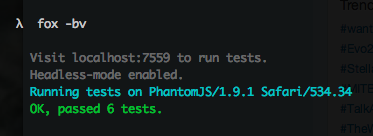
Research
Security News
Threat Actor Exposes Playbook for Exploiting npm to Build Blockchain-Powered Botnets
A threat actor's playbook for exploiting the npm ecosystem was exposed on the dark web, detailing how to build a blockchain-powered botnet.

A new pragmatic JavaScript testing framework fpr both NodeJS and browsers.
$ npm install -g fox
Create a new test document and name it test.js. ChaiJS' expect and assert modules are injected to the test modules by default;
describe('Number', function(){
it('converts a date to a number', function(){
expect( Number(new Date) ).to.be.a('number')
})
})
Available BDD methods:
$ fox # It'll look modules like test.js and test/index by default. You can specify them manually; fox test_foo.js test_b*.js
OK, passed 1 test.

$ fox -b
Visit localhost:7559 to run tests on a web browser
Once you pass -b parameter, fox compiles your source code for browsers and publishes a web page where you can run and see the test results.
If you have PhantomJS installed in your system, run fox with -bv parameters to run the tests headlessly;
$ fox -bv

FAQs
A set of CRM building packages
The npm package fox receives a total of 5 weekly downloads. As such, fox popularity was classified as not popular.
We found that fox demonstrated a not healthy version release cadence and project activity because the last version was released a year ago. It has 1 open source maintainer collaborating on the project.
Did you know?

Socket for GitHub automatically highlights issues in each pull request and monitors the health of all your open source dependencies. Discover the contents of your packages and block harmful activity before you install or update your dependencies.

Research
Security News
A threat actor's playbook for exploiting the npm ecosystem was exposed on the dark web, detailing how to build a blockchain-powered botnet.

Security News
NVD’s backlog surpasses 20,000 CVEs as analysis slows and NIST announces new system updates to address ongoing delays.

Security News
Research
A malicious npm package disguised as a WhatsApp client is exploiting authentication flows with a remote kill switch to exfiltrate data and destroy files.